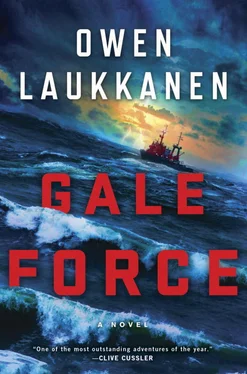Sato took a moment, admired the view. Breathed the fresh air. He and his colleagues had been imprisoned belowdecks for three days, confined mostly to darkness and the stale air of the holds. He’d ventured up to the weather deck once, when the cargo hold started to seem suffocating, but it had been nighttime, the ship’s minders asleep in the lounge, the air outside cold.
It was a beautiful day. It had been an uneventful voyage, so far, for better or for worse. Sato wasn’t seasick; that was a positive. Perhaps the only positive, at this point.
He produced his satellite phone. Entered the number he knew by heart, and waited to be connected.
The connection took time, longer than a cellular phone, and Sato held the phone to his ear, and watched the waves roll by. Then a click, and the connection was made. “Hai.”
“The product is not here,” Sato told the man on the other end of the line. “We’ve looked exhaustively.”
There was a pause. The connection clicked and coughed. Sato waited.
“Very well,” the man said at last. “We will have to escalate the matter.”
“I’ll wait for instruction,” Sato replied.
The other man didn’t bother to answer. He killed the call, leaving Sato alone again with the vast, open ocean, and the sky equally limitless. Sato indulged the view for another minute or two.
Then he closed the hatch and locked it, and set out to return to his colleagues.
• • •
THREE THOUSAND MILES away from the Pacific Lion , Katsuo Nakadate replaced the handset on his phone.
He turned in his chair, away from his desk and his computer, to stare out through vast picture windows at the city of Yokohama and the ocean beyond. He thought, with a long moment, about what he was going to do.
The syndicate’s interests remained in jeopardy. The bonds remained unrecovered. Nakadate would use any means to recover them, but still, he had hoped to confine any violence to the accountant Ishimaru, and perhaps to his accomplice on the freighter.
He didn’t relish the prospect of initiating conflict with civilians. He had hoped that Sato and his colleagues would have located the bonds on the freighter, that his most pressing concern would be bringing his men home.
But the bonds had disappeared. And that meant someone—an American—knew of their whereabouts.
Nakadate swiveled in his chair again, back to his phone. Picked up his handset and instructed his secretary to make another call.
He waited briefly. Then the call was placed, and Masao Tanaka answered on the first ring.
“Your colleagues have had no luck,” Nakadate told him. “It’s your turn to act.”
Four days into the tow.
McKenna made fresh coffee in the galley, and then climbed the stairs back to the wheelhouse. Nelson Ridley had the controls this morning. The engineer heard her coming, glanced back to greet her, and let his eyes fall meaningfully on the chart table by the stairs, the stainless-steel briefcase that sat upon it.
“You ever going to look inside that thing, skipper?” he asked McKenna. “It’s kind of giving me the heebie-jeebies here.”
McKenna handed Ridley a cup of coffee, took a sip of her own. Surveyed the wheelhouse, looked out through the windows. It was a nice enough day on the water: not much sun to speak of, but no wind, either, and nothing more than a low, westerly swell, as far as the seas were concerned. The Pacific Lion followed the Gale Force as she had for days now, and McKenna found it almost hard to believe that the well-behaved freighter dawdling behind the tug was the same beast of a ship that had nearly killed Court Harrington.
Of course, there was a reason that saving the Lion was worth thirty million dollars, and towing her to port only paid a fraction.
Ridley took the coffee, but he wasn’t about to let the subject drop. “I mean, be honest. Aren’t you at all curious?”
McKenna looked back at the briefcase, felt her body tense involuntary, constricting around her lungs just enough to be uncomfortable. She’d found the briefcase just where Harrington had described it, stashed under his bunk with a whole family of dust bunnies, had brought it up to the wheelhouse and looked at it for a while, long enough to make her feel uneasy. Then she’d set the thing down on the table, tried to forget about it. Tried to focus on the tow.
“Of course I’m curious,” she told Ridley. “But it’s locked, Nelson.”
Ridley raised an eyebrow. “We’re the roughest, toughest salvage tug on the North Pacific,” he said. “We raise ships from the dead. You don’t think we can open a briefcase?”
“I’m quite sure we can,” McKenna said. “It’s just—”
She trailed off, unsure how to tell Ridley how that damn case gave her the creeps, too, how she could close her eyes and hear the gunshots that had almost killed her and Harrington, see the look in the gunman’s eyes as he’d prepared to pull the trigger.
“I know,” Ridley said. “It’s weird, all right. But the kid’s got a valid argument. It’s lawfully our property.” He gave her a devilish grin. “What if there’s a million bucks in there, skipper? Wouldn’t you want to know?”
“I’ve already made my millions for this trip.” She forced a smile, gestured to the controls. “Let me take over here, would you? Grab a sandwich or something.”
Ridley paused, like he was debating pressing the issue. Finally, he shrugged. “You worried I’m going to crash your big boat?”
“I’m just saying, I’ve seen you drive that motorcycle of yours. Go on back to the engine room where you can’t wreck anything.”
“You’d be surprised.” Ridley retreated, casting one more meaningful glance at the briefcase before disappearing down the stairs and out of sight.
McKenna listened to her engineer fumbling around in the galley. Checked the autopilot, the GPS, replotted her course, anything to keep from thinking about that case.
The tug was making good time anyway, made it halfway across the Gulf of Alaska already. Another couple days, they’d home in on Cape St. James, the southern tip of the Haida Gwaii archipelago off the British Columbia coast. They’d skirt down the western side of Vancouver Island to the Strait of Juan de Fuca, cut in and down to Puget Sound in Seattle, and home, easy as pie. If the weather held, they might make it in early.
But the briefcase still gnawed at her. Throw it overboard, she thought. Forget about it. Hand it off to the authorities when you get to Seattle. Wash your hands of the whole ordeal.
Yeah, she thought. Maybe.
But even that wouldn’t guarantee safety. What if whoever owned the case came looking for it?
What would your dad do, girl?
Riptide Rhodes? McKenna couldn’t be sure, but she had a damn solid suspicion her dad wouldn’t be turning the case in to any authorities, not until he’d figured out what was inside.
It’s lawfully ours. Rules of the sea.
Her dad would have been curious. Hell, McKenna was curious. Just not enough to do anything about it, not yet.
She replotted the Gale Force ’s route on the GPS screen—again—the vast expanse of ocean, not another soul around for hundreds of miles. Sooner or later, though, the tug would reach landfall, and McKenna wondered what—or who—would be waiting for them when they arrived.
It was a worrying question, and McKenna had days and days to mull it over. She settled into an uneasy discontent, and it hung over her head and didn’t go away.
Court Harrington had just returned to his suite at Seattle’s Fairmont Olympic Hotel—hey, he was a millionaire now—when there came a knock at the door.
Читать дальше







![Маргарет Оуэн - Спасти Феникса [litres]](/books/405290/margaret-ouen-spasti-feniksa-litres-thumb.webp)
![Оуэн Дэмпси - Белая роза, Черный лес [litres]](/books/412437/ouen-dempsi-belaya-roza-chernyj-les-litres-thumb.webp)



